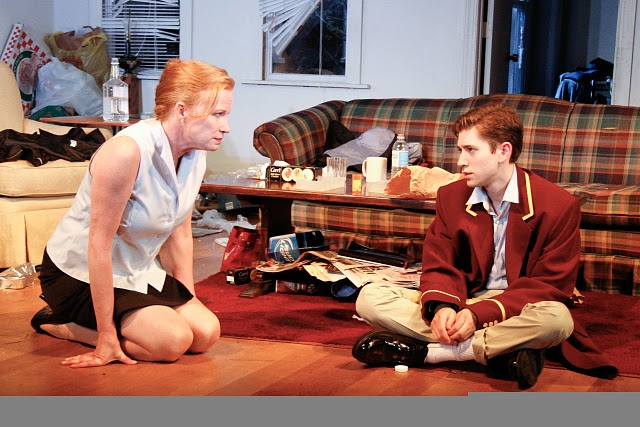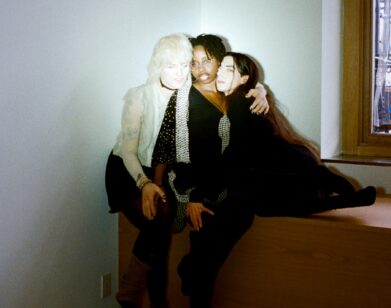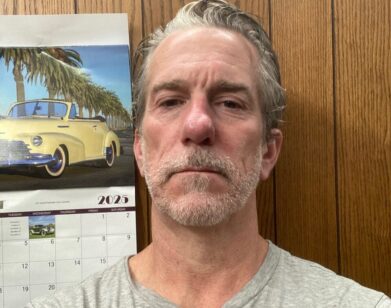Liz Meriwether: Beginning and End of the Fempire

JOHN LARROQUETTE (JASPER) AND MICHAEL ZEGEN (OLIVER PARKER).
PHOTO BY THE SHALTZES
Playwright and screenwriter Elizabeth Meriwether says she only writes when she feels “mischievous.” Recently, that mischief turned bi-coastal, as the 28-year-old spends weekdays in LA writing a movie for Universal Pictures and on the set of her in-production comedy, directed by Ivan Reitman, which stars Ashton Kutcher and Natalie Portman in a strictly-physical relationship. On the weekends, she returns to New York for her dark comedy, “Oliver Parker!” opening tonight at The Cherry Lane Theater in the West Village. We caught up with her in Marina Del Rey, on the seventh day she’d ever spent on a movie set:
KATE BRANCH: How different is it being on set, from working on the stage?
LIZ MERIWETHER: It’s hard to get your mind around it. Once you’ve done a scene, it’s over! In the theater, you can keep going back, and rehearse day after day. They are different muscles, and I hope I’m never in a situation where I need to choose one or the other.
BRANCH: To what extent were you involved in the casting and directing process for “Oliver Parker!”?
MERIWETHER: I was there for the auditions for Oliver [played by Michael Zegen]; and for everybody else, I was part of the discussion with Director Evan [Cabnet] and casting director James Calleri. I’ve worked with Evan before on “The Mistakes Madeline Made” (Naked Angels) about four years ago. I would not have been able to go back and forth between LA and New York if I didn’t trust Evan so much. We have a great shorthand: he knows my writing really well and he knows my process. That made it a lot easier for me to leave the play during the week—which is hard when it’s a new play because you want to be there all the time and listen to the way it sounds. Nonetheless, I felt like I was a divorced dad, or something, I was only seeing them on the weekends, and then trying to catch up on what had been happening during the week.
BRANCH: “Oliver Parker!” touches on some really serious subject matter–drugs, abuse, rape, politics, family. You were so close to stepping over boundaries. For example, the relationship between 17-year-old “sexual suicide bomber” Oliver (Michael Zegen) and the depressed 60-year-old alcoholic Jasper (John Larroquette).
MERIWETHER: Dysfunctional co-dependent relationships always appeal to me. I don’t know exactly how it started. I start writing sketches of characters and little scene-lets, and then it builds. I was thinking a lot about Dickens’s Oliver Twist and I was thinking about Shakespeare’s Prince Hal and Falstaff-which is strange. [Laughs] But I was thinking about the mentor-mentee relationship and how that dynamic can get emotionally complicated. I like to go to the edge of what is acceptable. I don’t set out to, but then I just end doing that, again and again. [Laughs] If I’m writing something and I’m not feeling mischievous, then I know it’s not going to be great.
BRANCH: That scene, towards the end, with Willa (Johanna Day) and Oliver (Zegen) on the ground. Willa having just taken painkillers, and Oliver desperately trying to have sex with her. Right before that scene, I was dying of laughter. And then all of a sudden I was tearing. How did you write that scene for Willa?
MERIWETHER: I started out wanting to be an actor and I like to give actors as much as possible. I love writing stuff where they can really lose control. And I think that scene came out of that—wanting to give her a chance to say everything and do everything that she sort of hasn’t done or said in a while. I love watching actors play. Being able to get up dance around and yell out, “Cunt!” I’m sort of from the “more is more” school of writing. [LAUGHS] LEFT: JOHANNA DAY (WILLA CROSS AND MICHAEL ZEGEN IN OLIVER PARKER. PHOTO BY THE SHALTZES
BRANCH: What made you choose “I Could Have Danced All Night” to be the song that made Willa emotionally break down out of her strong manner?
MERIWETHER: I love that song “I Could Have Danced All Night” from My Fair Lady so much. I love that song because watching it as a kid, it was such an unbridled expression of joy.
BRANCH: I need to ask you about the bizarre “dead cockroach” game Jasper and Oliver play from time to time: Where did you get that come from?
MERIWETHER: [LAUGHS] Actually, my cousin has a kid who was about three at the time. They came to dinner with my family, around the time that I was writing the play. It was a party trick: “Do the dead cockroach!” My cousin’s daughter got on her back and put her hands and feet up in the air, and I just thought it was so funny. It seems so strange: this horrifying image of a dying cockroach, but having this adorable child doing it.
BRANCH: I have to bring up the “The Fempire”—your group of fellow screenwriters Dana Fox (What Happens in Vegas, 2008), (Diablo Cody (The United States of Tara, 2009), and Lorene Scafaria (Nick and Nora’s Infinite Playlist, 2008).
MERIWETHER: That was a joke that got out of control. We don’t sit around and think about how awesome we are, and call ourselves, “The Fempire.” There are a lot of women screenwriters, but they are obviously outnumbered by men. And it still is a very much male-dominated industry. I think it is easy for women to get bitchy and jealous—of course, it is easy for men to be that way, too—but it’s nice to find people that you don’t have to feel that way around who also do what you do.






